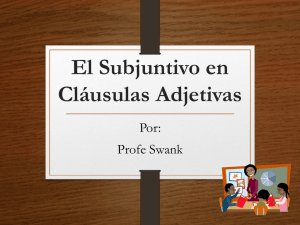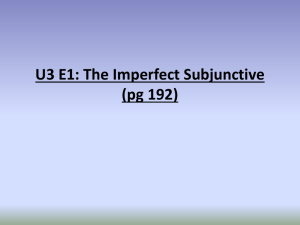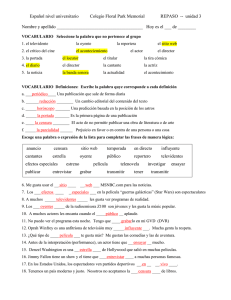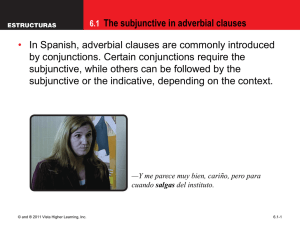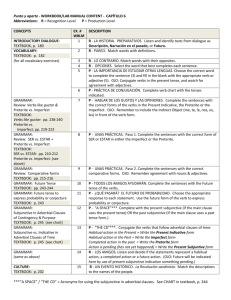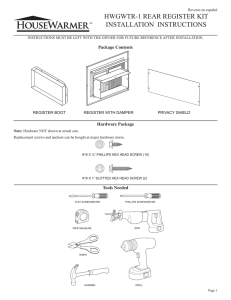mood Are you in the for some SUBJUNCTIVE????
advertisement
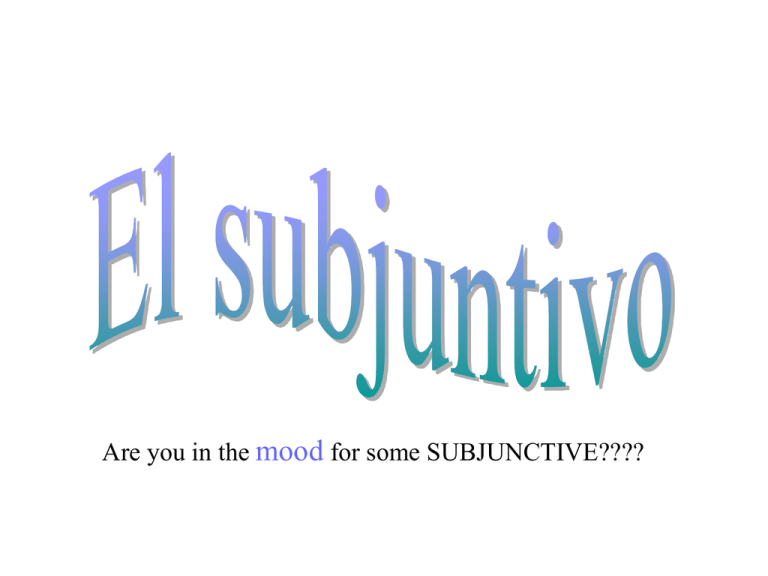
Are you in the mood for some SUBJUNCTIVE???? Indicative • Is a Tense, which refers to when an action takes place (past, present, future) • The indicative mood is used to express factual information, certainty, and objectivity. Ej. Usted estudia en Perú. You study in Peru. Subjuntivo • The subjunctive is not a tense; rather, it is a mood. Mood reflects how the speaker feels about the action. The subjunctive mood is rarely used in English, but it is widely used in Spanish. Ej Dudo que usted estudie en Perú. I doubt that you study in Peru. Ej Dudo que usted estudie en Perú. I doubt that you study in Peru. In the above sentence, the clause "dudo" introduces a quality of uncertainty, -- the speaker does have doubt, so here the subjunctive mood is used in the second clause (estudie) Subjunctive in the dependent clause • Usually, the subjunctive mood is used in dependent clauses introduced by que (which, that, who) when the independent clause expresses a wish, a strong emotional attitude, or an uncertainty. Ej. Espero que María duerma. (I hope that María is sleeping), El subjuntivo Forming the subjunctive We form the present subjunctive of most verbs the same way we form negative tú commands. PASO 1: Form the present tense of the yo form PASO 2: Drop the o PASO 3: add the subjunctive ending which is the opposite AR verbs e emos es éis e en ER/IR verbs a amos as áis a an Práctica 1. El camarero quiere que tú_________ (probar) la tarta. 2. El cocinero no quiere que la asistente _______(hervir) el agua. 3. Yo recomiedo que ella_________(pedir) el gazpacho. 4. Yo sugiero que ellos __________(comprar) un coche Toyota. ¡OJO! SPELLING CHANGES -car (cqu) Mamá quiere que busquemos ajo y cebolla para el gazpacho. -gar (ggu) Recomendamos que Juan apague la barbacoa. -zar (zc) Sugiero que crucemos la calle ahora. Indicative vs. Subjunctive ¡IMPORTANTE! • The subjunctive mood is used to express things like WEIRDO= Subjunctive Wishes (desear, esperar, exigir, decir, querer, preferir, pedir, necesitar…) Emotions (alegrarse, enojar, sentir, encantar, gustar, lamentar, sorprender, ….) Impersonal expressions (es importante, es necesario, es raro, es bueno…) Recommendations (recomendar, sugerir, aconsejar, mandar, insistir…) Doubt and denial (dudar, no creer, no estar seguro, no es cierto,…) Ojalá (God willing) In other words everything except certainty and objectivity: Calls for a dependent clause • Usually, the subjunctive mood is used in dependent clauses introduced by que (which, that, who) when the independent clause expresses a wish, a strong emotional attitude, or an uncertainty. Ej. Espero que María duerma. (I hope that María is sleeping), Presente AR/ER Subjuntivo AR/ER AR and ER boot verbs stay boots in the subjunctive AR boot verbs • O UE – Probar and probarse – Acostarse – Colgar * – Encontrar – Mostrar – Recordar • U UE – Jugar * *Watch for spelling changes • E IE – Cerrar – Despertarse – Pensar – Recomendar – Empezar * – Nevar – Sentar ER boot verbs • O UE – Poder – Soler – Devolver – Revolver – Volver – Llover • E IE – Perder – Querer – Encender Presente Subjuntivo No more boot….all “I” s IR (ei) i i i i i i i i i i IR boot verbs that are ei in the present explode into all i ‘s in the subjunctive IR boot verbs • E I – Pedir – Despedirse – Servir – Vestirse – Conseguir* – Seguir * *The irregular yo form is consigo and sigo Presente Subjuntivo u ue IR (oue) ue ue ue ue ue u ue ue IR (eie) ie ie ie ie ie i i ie ie ie IR boot verbs • O UE – Dormir – Morir • E IE – Preferir – Divertirse – Hervir – Mentir – Sentirse – sugerir Los cambios en el subjuntivo 1. Change in all forms car = que, ques, que, quemos, quéis, quen gar = gue, gues, gue, guemos, guéis, guen zar = ce, ces, ce, cemos, céis, cen 2. Change in all forms Ger/gir = ja, jas, ja, jamos, jáis, jan ESCOGER escoja escojamos escojas escojáis escoja escojan cer/cir = zca, zcas, zca, zcamos, zcáis, zcan CONDUCIR conduzca conduzcamos conduzcas conduzcáis conduzca conduzcan Go verbs PONER ponga pongamos pongas pongáis ponga pongan uir= ya, yas, ya, yamos, yáis yan INFLUIR influya influyamos influyas influyáis influya influyan 3. AR and ER boot verbs Change as boot verbs (in subjunctive) RECORDAR recuerde recordemos recuerdes recordéis recuerde recuerden PERDER pierda perdamos pierdas perdáis pierda pierdan 4. IR boot verbs ei changes in ALL forms of the subjunctive (not boot verbs anymore PEDIR pida pidamos pidas pidáis pida pidan oue changes in all forms except nosotros and vosotros change ou DORMIR duerma durmamos duermas durmáis duerma duerman eie changes in all forms except nosotros and vosotros change ei PREFERIR prefiera prefiramos prefieras prefiráis prefiera prefieran Irregular Subjunctive • Think DISHES (dar, ir, ser, haber, estar, saber) el subjuntivo: dar (to give) dé demos des deis dé den Quiero que me des un café. Ir- to go vaya vayamos vayas vayáis vaya vayan Digo que tú vayas a tu cuarto. El subjuntivo: Ser (to be) DOCTOR (description, occupation, charactieristics, time/date, origin, relationship sea seamos seas seáis sea sean Tememos (we fear) que los PSSAs sean mas largos en el futuro. Haber Haya Hayamos Hayas Haya Hayáis Hayan Note there is usually only one form...”haya” which means there is/are Quiero que haya muchos pasteles en la fiesta. Espero que haya suficiente dinero en my cuenta para comprar mi Ferari nuevo. el subjuntivo: estar (to be) LACE (location, action in progress, condition, emotion esté estemos estés estéis esté estén Es una lastima que ella esté enferma. Saber- to know how to do something, to know facts sepa sepamos sepas sepáis sepa sepan Esperamos que el muchacho sepa la respuesta.
